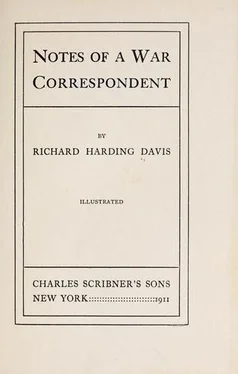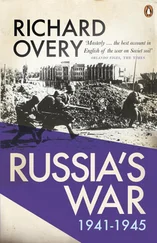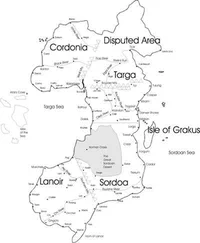Richard Davis - Notes of a War Correspondent
Здесь есть возможность читать онлайн «Richard Davis - Notes of a War Correspondent» весь текст электронной книги совершенно бесплатно (целиком полную версию без сокращений). В некоторых случаях можно слушать аудио, скачать через торрент в формате fb2 и присутствует краткое содержание. Город: New York, Год выпуска: 1911, Издательство: Charles Scribner’s Sons, Жанр: Публицистика, prose_military, на английском языке. Описание произведения, (предисловие) а так же отзывы посетителей доступны на портале библиотеки ЛибКат.
- Название:Notes of a War Correspondent
- Автор:
- Издательство:Charles Scribner’s Sons
- Жанр:
- Год:1911
- Город:New York
- ISBN:нет данных
- Рейтинг книги:5 / 5. Голосов: 1
-
Избранное:Добавить в избранное
- Отзывы:
-
Ваша оценка:
- 100
- 1
- 2
- 3
- 4
- 5
Notes of a War Correspondent: краткое содержание, описание и аннотация
Предлагаем к чтению аннотацию, описание, краткое содержание или предисловие (зависит от того, что написал сам автор книги «Notes of a War Correspondent»). Если вы не нашли необходимую информацию о книге — напишите в комментариях, мы постараемся отыскать её.
Summary by Neeru Iyer
Notes of a War Correspondent — читать онлайн бесплатно полную книгу (весь текст) целиком
Ниже представлен текст книги, разбитый по страницам. Система сохранения места последней прочитанной страницы, позволяет с удобством читать онлайн бесплатно книгу «Notes of a War Correspondent», без необходимости каждый раз заново искать на чём Вы остановились. Поставьте закладку, и сможете в любой момент перейти на страницу, на которой закончили чтение.
Интервал:
Закладка:
The wig-waggers on Convent Hill had already seen them, and the townspeople and the garrison were rushing through the streets to meet them, cheering and shouting, and some of them weeping. Others, so officers tell me, who were in the different camps, looked down upon the figures galloping across the plain in the twilight, and continued making tea.
Just as they had reached the centre of the town, General Sir George White and his staff rode down from head-quarters and met the men whose coming meant for him life and peace and success. They were advancing at a walk, with the cheering people hanging to their stirrups, clutching at their hands and hanging to the bridles of their horses.
General White’s first greeting was characteristically unselfish and loyal, and typical of the British officer. He gave no sign of his own in calculable relief, nor did he give to Cæsar the things which were Cæsar’s. He did not cheer Dundonald, nor Buller, nor the column which had rescued him and his garrison from present starvation and probable imprisonment at Pretoria. He raised his helmet and cried, “We will give three cheers for the Queen!” And then the general and the healthy, ragged, and sunburned troopers from the outside world, the starved, fever-ridden garrison, and the starved, fever-ridden civilians stood with hats off and sang their national anthem.
The column outside had been fighting steadily for six weeks to get Dundonald or any one of its force into Ladysmith; for fourteen days it had been living in the open, fighting by night as well as by day, without halt or respite; the garrison inside had been for four months holding the enemy at bay with the point of the bayonet; it was famished for food, it was rotten with fever, and yet when the relief came and all turned out well, the first thought of every one was for the Queen!
It may be credulous in them or old-fashioned; but it is certainly very unselfish, and when you take their point of view it is certainly very fine.
After the Queen every one else had his share of the cheering, and General White could not complain of the heartiness with which they greeted him, he tried to make a speech in reply, but it was a brief one. He spoke of how much they owed to General Buller and his column, and he congratulated his own soldiers on the defence they had made.
“I am very sorry, men,” he said, “that I had to cut down your rations. I—I promise you I won’t do it again.”
Then he stopped very suddenly and whirled his horse’s head around and rode away. Judging from the number of times they told me of this, the fact that they had all but seen an English general give way to his feelings seemed to have impressed the civilian mind of Ladysmith more than the entrance of the relief force. The men having come in and demonstrated that the way was open, rode forth again, and the relief of Ladysmith had taken place. But it is not the people cheering in the dark streets, nor General White breaking down in his speech of welcome, which gives the note to the way the men of Ladysmith received their freedom. It is rather the fact that as the two hundred battle-stained and earth-stained troopers galloped forward, racing to be the first, and rising in their stirrups to cheer, the men in the hospital camps said, “Well, they’re come at last, have they?” and continued fussing over their fourth of a ration of tea. That gives the real picture of how Ladysmith came into her inheritance, and of how she received her rescuers.
On the morning after Dundonald had ridden in and out of Ladysmith, two other correspondents and myself started to relieve it on our own account. We did not know the way to Ladysmith, and we did not then know whether or not the Boers still occupied Bulwana Mountain. But we argued that the chances of the Boers having raised the siege were so good that it was worth risking their not having done so, and being taken prisoner.
We carried all the tobacco we could pack in our saddle-bags, and enough food for one day. My chief regret was that my government, with true republican simplicity, had given me a passport, type-written on a modest sheet of notepaper and wofully lacking in impressive seals and coats of arms. I fancied it would look to Boer eyes like one I might have forged for myself in the writing-room of the hotel at Cape Town.
We had ridden up Pieter’s Hill and scrambled down on its other side before we learned that the night before Dundonald had raised the siege. We learned this from long trains of artillery and regiments of infantry which already were moving forward over the great plain which lies between Pieter’s and Bulwana. We learned it also from the silence of conscientious, dutiful correspondents, who came galloping back as we galloped forward, and who made wide détours at sight of us, or who, when we hailed them, lashed their ponies over the red rocks and pretended not to hear, each unselfishly turning his back on Ladysmith in the hope that he might be the first to send word that the “Doomed City” was relieved. This would enable one paper to say that it had the news “on the street” five minutes earlier than its hated rivals. We found that the rivalry of our respective papers bored us. We condemned it as being childish and weak. London, New York, Chicago were names, they were spots thousands of leagues away: Ladysmith was just across that mountain. If our horses held out at the pace, we would be—after Dundonald—the first men in. We imagined that we would see hysterical women and starving men. They would wring our hands, and say, “God bless you,” and we would halt our steaming horses in the market-place, and distribute the news of the outside world, and tobacco. There would be shattered houses, roofless homes, deep pits in the roadways where the shells had burst and buried themselves. We would see the entombed miner at the moment of his deliverance, we would be among the first from the outer world to break the spell of his silence; the first to receive the brunt of the imprisoned people’s gratitude and rejoicings.
Indeed, it was clearly our duty to the papers that employed us that we should not send them news, but that we should be the first to enter Ladysmith. We were surely the best judges of what was best to do. How like them to try to dictate to us from London and New York, when we were on the spot! It was absurd. We shouted this to each other as we raced in and out of the long confused column, lashing viciously with our whips. We stumbled around pieces of artillery, slid in between dripping water-carts, dodged the horns of weary oxen, scattered companies of straggling Tommies, and ducked under protruding tent-poles on the baggage-wagons, and at last came out together again in advance of the dusty column.
“Besides, we don’t know where the press-censor is, do we?” No, of course we had no idea where the press-censor was, and unless he said that Ladysmith was relieved, the fact that twenty-five thousand other soldiers said so counted for idle gossip. Our papers could not expect us to go riding over mountains the day Ladysmith was relieved, hunting for a press-censor. “That press-censor,” gasped Hartland, “never—is—where he—ought to be.” The words were bumped out of him as he was shot up and down in the saddle. That was it. It was the press-censor’s fault. Our consciences were clear now. If our papers worried themselves or us because they did not receive the great news until every one else knew of it, it was all because of that press-censor. We smiled again and spurred the horses forward. We abused the press-censor roundly—we were extremely indignant with him. It was so like him to lose himself the day Ladysmith was relieved. “Confound him,” we muttered, and grinned guiltily. We felt as we used to feel when we were playing truant from school.
We were nearing Pieter’s Station now, and were half-way to Ladysmith. But the van of the army was still about us. Was it possible that it stretched already into the beleaguered city? Were we, after all, to be cheated of the first and freshest impressions? The tall lancers turned at the sound of the horses’ hoofs and stared, infantry officers on foot smiled up at us sadly, they were dirty and dusty and sweating, they carried rifles and cross belts like the Tommies; and they knew that we outsiders who were not under orders would see the chosen city before them. Some of them shouted to us, but we only nodded and galloped on. We wanted to get rid of them all, but they were interminable. When we thought we had shaken them off, and that we were at last in advance, we would come upon a group of them resting on the same ground their shells had torn up during the battle the day before.
Читать дальшеИнтервал:
Закладка:
Похожие книги на «Notes of a War Correspondent»
Представляем Вашему вниманию похожие книги на «Notes of a War Correspondent» списком для выбора. Мы отобрали схожую по названию и смыслу литературу в надежде предоставить читателям больше вариантов отыскать новые, интересные, ещё непрочитанные произведения.
Обсуждение, отзывы о книге «Notes of a War Correspondent» и просто собственные мнения читателей. Оставьте ваши комментарии, напишите, что Вы думаете о произведении, его смысле или главных героях. Укажите что конкретно понравилось, а что нет, и почему Вы так считаете.












